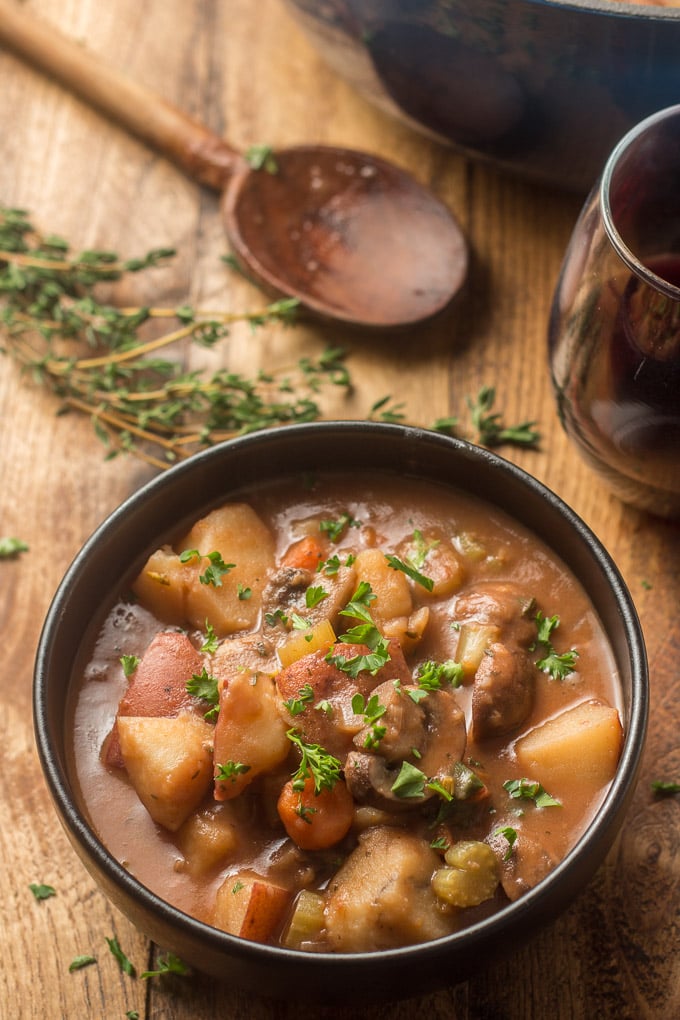I didn't even adapt this one much, since Connoisseurus Veg did such an excellent job... but here, have the link and my notes.
Vegan Beef Stew
Now, for all I call it "Beefless Stew", mine actually has more beef in it than the original, vegan recipe. I'm not vegetarian or vegan myself, and when I discovered that beef broth (and chicken broth, for that matter) contains very little protein, I decided I might as well make use of what flavor it can provide.
So for starters, I use a quart of beef stock instead of veggie broth. It means I can bypass the Marmite which is recommended for its savory quality; a good beef broth has that. I also skip the liquid smoke, but mostly because I'm especially sensitive to it; a little can overpower a dish for me.
The other ingredient I substitute is the flour -- I keep fine Asian rice flour on hand, but if I didn't, I'd use a little tapioca starch. It just gives the stew some body.
The herb quantities in the recipe are, not to put too fine a point on it, wrong. Two tablespoons of fresh rosemary, at least here in California, are enough to season a week's worth of dinners. I use two sprigs, maybe a half-tablespoon. I use the same amount of dried thyme. I might use the same amount of even fresh thyme, but then again, I like thyme. Don't use multiple tablespoons unless you're using dried herbs from the 90s.
(An additional note: I don't drink wine, particularly red, so I can report with certainty that cheap wine is okay. I buy Trader Joe's Two-Buck Chuck cabernet for recipes like this, stick it in the cupboard between uses, and I haven't ruined a dish yet. Wine drinkers shudder, but this is cooking wine.)
As for technique... well, I'm not known for my patience sometimes. When I'm already spending the better part of an hour chopping and measuring ingredients -- the mushrooms alone require some time to take them apart and slice them into chunks -- I don't want to throw it all into a pot and wait another two hours for the potatoes to get done. (I know, it says 40 minutes. If you've ever had potatoes sulk and stay crunchy long past when you expected them to get soft, you understand my frustration.)
I chop the potatoes into 1 inch chunks first, throw them in a bowl of water, and cook them in a microwave for 6 to 8 minutes. I stop when they're just soft enough to get a fork tine through, before they really start to break up, then I set the bowl aside. If you don't have a microwave, boiling the diced potatoes doesn't take more than about 15 minutes.
In the meantime (I'm all about multitasking) I chop the carrots and celery, and then I work on the onions, slicing them thin. When I finish those, I set them to fry over low heat in the stewpot on the stove. I want them to be starting to caramelize by the time I add the mushrooms; it's true that I abhor raw onions, but it's also true that nothing gives a stew real depth of flavor like caramelized onion, whether you're using beef broth or not.
When the potatoes are done, the carrots get cooked for a couple of minutes, just because I don't like really crunchy carrots in soup, and I want to eat ASAP most of the time. You could toss them into the potatoes for the last 5 minutes, if you're doing those in a pot.
Meanwhile, I'm back to the cutting board with the mushrooms. I don't hold out for cremini or portobello to go on sale; white button mushrooms work too. I take the stems out and slice those into rounds, because I like the different texture, then dice the caps to about 3/4". I err on larger rather than smaller, so that I get those nice meaty chunks at the end.
I smash a couple of garlic cloves, and it's time to start adding things to the pot. Mushrooms first, until they sweat. Then garlic, celery, carrots (if separate), and flour, mix it all about for a minute, quench with broth, then add the drained potatoes (don't forget the starchy sludge at the bottom!), herbs, wine, tomato paste (I leave that out half the time), and salt and pepper. Whew.
I let all that come to a simmer and meld for five or ten minutes. The flavors do permeate the potatoes just fine, I find, without extensive cooking. By the time I've tidied the mess, rustled up a bowl and utensils, and settled on what I want to drink, it's ready to be dished up.
This is a hearty stew which is marvelous for cold evenings, and one pot of it can feed my hearty appetite for two nights plus a lunch -- about five large soup bowls. It's why I don't mind so much when it takes so much cutting-board prep. And it tastes amazing.


No comments:
Post a Comment